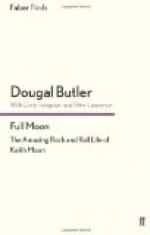“How can I explain what I do not know?” Charles was silent for a moment, then added bitterly. “It may be because of her father’s inhuman conduct.”
“Robert Turold is dead—do not use that tone in speaking of him,” the lawyer counselled.
Charles turned on him a peculiar look. “Do you think the world is the loser by his death?” he said.
Mr. Brimsdown was moved out of himself to declare that the death of Robert Turold was a distinct loss to the world. “He was a wonderful man—a notable personality,” he said emphatically.
Charles gave him a moody glance, and there fell upon them a silence so complete that the dead man in the bed seemed to share in it. The lawyer had an acute perception of the fact that he had handled the situation badly. He intuitively realized that he had put himself into the opposite camp to Charles’s sympathies by the uncompromising partisanship of his last remarks. He was convinced that until that moment, Charles had been meditating the question of some further disclosure. Mr. Brimsdown regretted afterwards that he made no effort to gain his confidence. He felt that if he had done so events might have taken a different course. But it is difficult to bring youth and age together. Youth sometimes yields to impulse, but not age. The lurking devil of self-consciousness whispers caution as the safer quality. Mr. Brimsdown hearkened to the whisper, and stood there in silence, while the minutes slipped by which might have bridged the gap.
There was a quick step in the passage outside, and the door opened to admit Detective Barrant. He looked inquiringly from one to the other, and addressed himself to the lawyer.
“Are you Mr. Brimsdown?” he asked.
“That is my name,” the lawyer replied.
“I am Detective Barrant of Scotland Yard. I wish to speak to you privately.”
His emphasis on the last word was not lost on Charles Turold. With a slight indifferent nod to Mr. Brimsdown he went out of the room, closing the door quietly behind him.
“I have come to see you about this letter which you left with Inspector Dawfield.” Barrant produced the letter and took the single sheet from the grey envelope.
“That is the reason of my presence in Cornwall,” said Mr. Brimsdown.
“So I imagined. What can you tell me about it?”
“Very little, except that I received it by the last post at my chambers in Lincoln’s Inn Fields the night after Robert Turold’s death.”
“But why did he send for you?”
“That I cannot even guess.”
“You surely must have some idea.”
“If I had I should be only too happy to assist the course of justice by imparting it to you.”
There was a dryness in the tone of this reply which warned Barrant that he had made a blunder in allowing his irritation to get the better of him. But his private opinion was that the letter was the outcome of some secret of the dead man’s which he had imparted to his lawyer. He changed his mood with supple swiftness, in order to extract the information.




